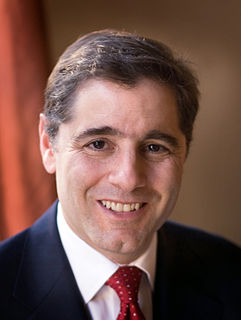A Quote by Ajit Pai
Some claim that the Obama FCC's regulations are necessary to protect Internet openness. History proves this assertion false. We had a free and open Internet prior to 2015, and we will have a free and open Internet once these regulations are repealed.
Related Quotes
We have to ensure free and open exchange of information. That starts with an open internet. I will take a backseat to no one in my commitment to network neutrality. Because once providers start to privilege some applications or websites over others then the smaller voices get squeezed out and we all lose. The internet is perhaps the most open network in history, and we have to keep it that way.
I have been a strong supporter of a free and open Internet and have indicated this both prior to and subsequent to being sworn in as chairman of the F.C.C. I believe it is important to take concrete and reasonable steps to protect the freedom of users and entrepreneurs and businesses both small and large on the Internet.
The rise of a ubiquitous Internet, along with 24-hour news channels has, in some sense, had the opposite effect from what many might have hoped such free and open access to information would have had. It has instead provided free and open access, without the traditional media filters, to a barrage of disinformation.
Beginning in the Clinton administration, there was, for nearly two decades, a broad bipartisan consensus that the best Internet policy was light-touch regulation - rules that promoted competition and kept the Internet 'unfettered by federal or state regulation.' Under this policy, a free and open Internet flourished.
Google will be obliged either to accept Chinese regulations or exit the world's largest Internet market, with serious consequences for its long-term global ambitions. This is a metaphor for our times: America's most dynamic company cannot take on the Chinese government - even on an issue like free and open information - and win.
There is a regulation of behavior on the Internet and in cyberspace, but that regulation is imposed primarily through code. The differences in the regulations effected through code distinguish different parts of the Internet and cyberspace. In some places, life is fairly free; in other places, it is more controlled. And the difference between these spaces is simply a difference in the architectures of control--that is, a difference in code.
Everyone should be concerned about Internet anarchy in which anybody can pretend to be anybody else, unless something is done to stop it. If hoaxes like this go unchecked, who can believe anything they see on the Internet? What good would the Internet be then? If the people who control Internet web sites do not do anything, is that not an open invitation for government to step in? And does anybody want politicians to control what can go on the Internet?


































